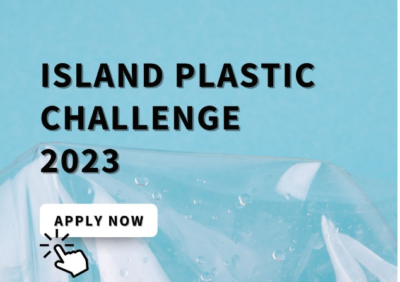USAID’s Clean Cities, Blue Ocean’s program drew to a close in Sri Lanka in January 2024. USAID is continuing to address plastic pollution in Sri Lanka through USAID/Sri Lanka and the Maldives’ Ocean Plastics Reduction Activity (2022-2027).
As a densely populated island nation of over 23 million (2023), Sri Lanka faces unique challenges in managing its solid waste. Waste management systems in the country have struggled to keep pace as urban populations have grown and system funding, organization, while local government resources have remained static. A 2020 report estimated that, across the country, only 20 percent of households had access to public waste collection services, while 47 percent burned their waste, 23 percent disposed of it in their communities or natural environments, and about eight percent practiced backyard composting for organic waste. USAID’s Clean Cities, Blue Ocean program is piloting solutions to build coordinated waste management systems with increased local government capacity to reduce ocean plastic pollution.
From 2019-2024, USAID’s Clean Cities, Blue Ocean program piloted solutions in Sri Lanka to build coordinated waste management systems with increased local government capacity to reduce ocean plastic pollution.
Engagement Sites
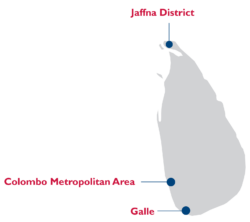 At the national level, USAID supported Sri Lanka’s national government in building a more sustainable, circular economy that fully engages the private sector as key players in the fight against ocean plastic pollution through Extended Producer Responsibility legislation. The program also piloted solutions in the following three engagement sites:
At the national level, USAID supported Sri Lanka’s national government in building a more sustainable, circular economy that fully engages the private sector as key players in the fight against ocean plastic pollution through Extended Producer Responsibility legislation. The program also piloted solutions in the following three engagement sites:
-
- In Colombo, USAID partnered with leading companies to reduce their plastic footprint; engaging local and national government authorities to design and launch three plastic recovery centers in the Kaduwela Municipal Council; and strengthened the local authority over the management of plastic waste.
- In Galle, USAID partnered with local grantees to improve coordination and participatory decision-making related to solid waste management planning to move the city towards a circular economy—including, developing an Integrated Solid Waste Management Action Plan that formalizes the role of the informal waste collector and the services they provide.
- In Jaffna, USAID worked with local grantees to improve recycling rates across the district, strengthen logistics for collecting and processing the recycled waste, and build the capacity of local authorities to manage the resulting increased volume of recyclables.
Impacts and Results
In Sri Lanka, Clean Cities, Blue Ocean:
- Safely managed and prevented over 20,000 metric tons of waste (including 5,000 metric tons of plastic–the equivalent of nearly half a billion plastic bottles) from entering into drainage canals, rivers, streams—and ultimately the ocean.
- Trained over 4,700 people from local government, informal waste sector, and local organizations to build local capacity for solid waste management planning and programs, representing over 224 entities (137+ microenterprises).
- Improved solid waste systems and services for over 862,000 people through support to and partnerships with government entities, local organizations, and businesses.
- Developed 18 innovations to improve waste collection, management, and policy–including Sri Lanka’s first Extended Producer Responsibility system and supporting online reporting platform to track private sector production and recovery.
- Awarded over $1.3 million in grant funding and in-kind support to local partners and governments to implement effective, locally-led solutions.
Program Grantees
- In 2021 and 2022, Ceylon Chamber of Commerce (CCC) building off their grant from USAID’s Municipal Waste Recycling Program, increased the amount of PET and HIPS packaging that is collected and upcycled by creating private sector consortias to facilitate implementation. They also designed and operationalized an online Plastic Use Reporting System.
- Human and Environment Links Progressive Organization (HELP-O) is improving coordination and participatory decision-making for solid waste management planning in Galle that can move the city towards a circular economy model. To do this, HELP-O is coordinating with the Galle Municipal Council and other city stakeholders to fill in data gaps to better understand the waste management system and 3R/SWM practices, develop an Integrated Solid Waste Management Action Plan that will formalize the role of informal waste collectors in the value chain, and identify and pilot supporting programs.
- From 2022 to 2024, The Island Climate Initiative (ICI) supported local and national companies to reduce their single-use plastic footprint through a series of challenges where innovators can propose solutions to specific challenges facing companies in reducing or eliminating plastic from their operations.
- From 2022 to 2024, Janathakshan worked closely with local and national government authorities to design and launch three plastic recovery centers in the Kaduwela Municipal Council, Colombo. The facilities are enabling plastics to be purchased from informal waste collectors at fair market value to be sorted, cleaned, bailed, or crushed for sale to commercial recyclers that have offtake agreements with the centers. The centers are now helping to meet market demands for cleaned, recyclable plastics and provide a more reliable income stream for informal waste collectors.
- Over 2021-2023, Public Interest Law Foundation (PILF) carried out a comprehensive review and assessment of the existing legal and regulatory frameworks on plastic use and waste management in Sri Lanka under the USAID Municipal Waste Recycling Program. With those findings, PILF identified three focus areas in consultation with the Ministry of Environment, Central Environmental Authority, and other stakeholders, and is developing proposals to strengthen local management authority of plastic waste; draft regulations for extended producer responsibility on prioritized plastics; and develop guidelines for the management of non-hazardous/non-infectious hospital plastic and polythene waste.
- SEVANATHA Urban Resource Center is strengthening the waste value chain by identifying and filling gaps in source separation, collection, policies, and markets for plastic materials in Moratuwa. By involving and incorporating feedback from multiple stakeholders, Sevanatha will design and test a 3R Action Plan that advances the Moratuwa Municipal Council toward its zero waste goals.
Insights & Updates
See All Insights & Updates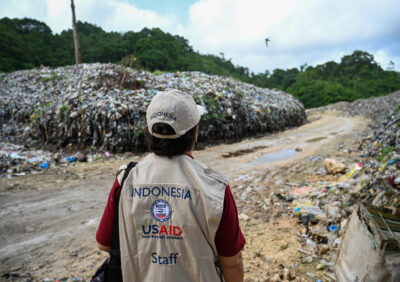
Preventing More Than One Million Tons of Plastic from Entering the Environment
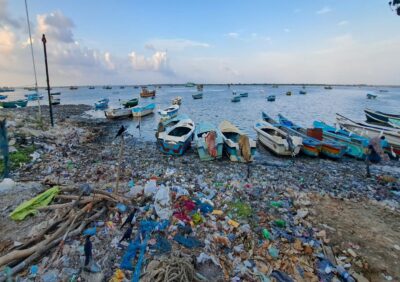
From the Field: How a Coastal Community Revived its Waterways through Improved Waste Management
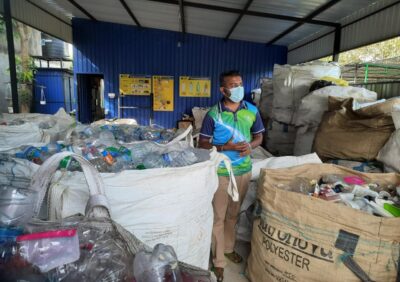
USAID’s Clean Cities, Blue Ocean Program Helps Prevent Over 4,600 MT of Plastic from Entering the Ocean
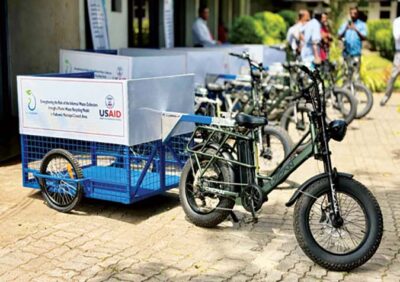
USAID and Lumala Revolutionize Waste Management Practices in Sri Lanka
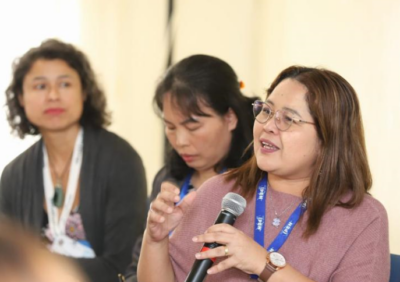
USAID Shares Key Recommendations for Developing Inclusive Extended Producer Responsibility Frameworks in Support of International Plastics Treaty Negotiations
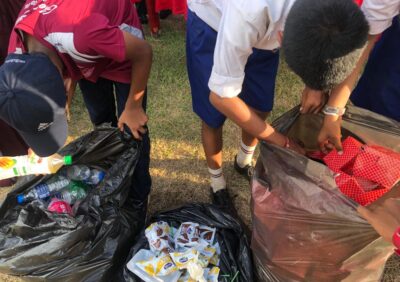
From the Field: Empowering Youth as Agents of Change to Reduce Ocean Plastic Pollution
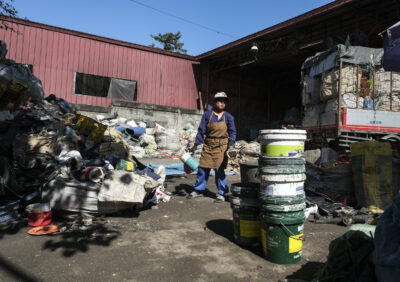
Six Ways USAID is Advancing Gender Equality in the Waste Sector
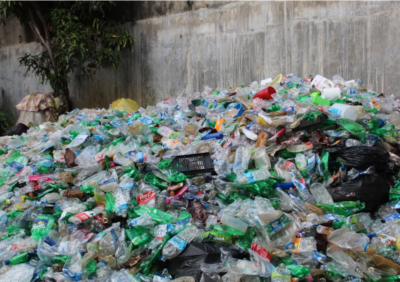
Fostering Partnerships in Sri Lanka to Reduce Ocean Plastic Pollution
